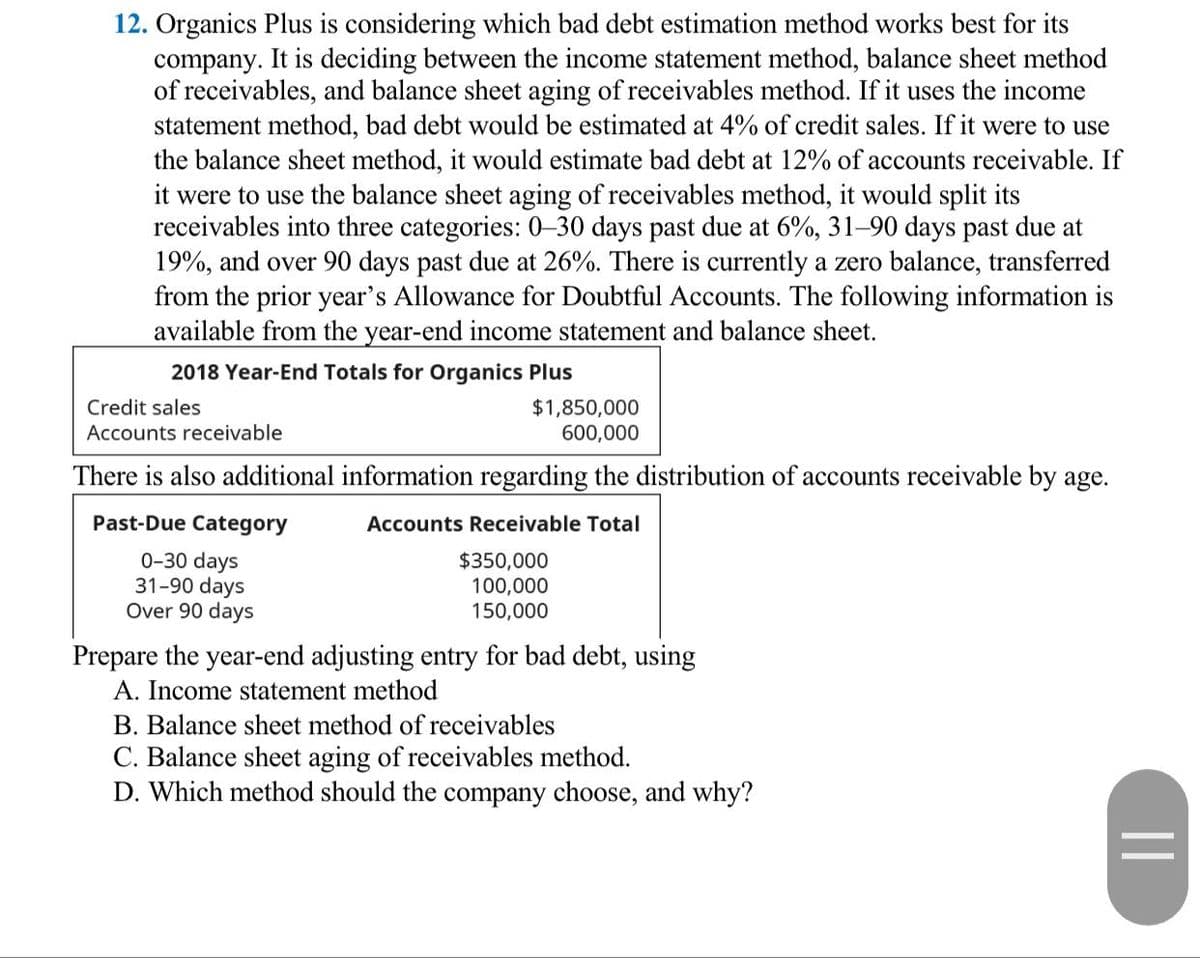12. Organics Plus is considering which bad debt estimation method works best for its company. It is deciding between the income statement method, balance sheet method of receivables, and balance sheet aging of receivables method. If it uses the income statement method, bad debt would be estimated at 4% of credit sales. If it were to use the balance sheet method, it would estimate bad debt at 12% of accounts receivable. If it were to use the balance sheet aging of receivables method, it would split its receivables into three categories: 0–30 days past due at 6%, 31–90 days past due at 19%, and over 90 days past due at 26%. There is currently a zero balance, transferred from the prior year's Allowance for Doubtful Accounts. The following information is available from the year-end income statement and balance sheet. 2018 Year-End Totals for Organics Plus Credit sales $1,850,000 600,000 Accounts receivable There is also additional information regarding the distribution of accounts receivable by age. Past-Due Category Accounts Receivable Total 0-30 days 31-90 days Over 90 days $350,000 100,000 150,000 Prepare the year-end adjusting entry for bad debt, using A. Income statement method B. Balance sheet method of receivables C. Balance sheet aging of receivables method. D. Which method should the company choose, and why?
12. Organics Plus is considering which bad debt estimation method works best for its company. It is deciding between the income statement method, balance sheet method of receivables, and balance sheet aging of receivables method. If it uses the income statement method, bad debt would be estimated at 4% of credit sales. If it were to use the balance sheet method, it would estimate bad debt at 12% of accounts receivable. If it were to use the balance sheet aging of receivables method, it would split its receivables into three categories: 0–30 days past due at 6%, 31–90 days past due at 19%, and over 90 days past due at 26%. There is currently a zero balance, transferred from the prior year's Allowance for Doubtful Accounts. The following information is available from the year-end income statement and balance sheet. 2018 Year-End Totals for Organics Plus Credit sales $1,850,000 600,000 Accounts receivable There is also additional information regarding the distribution of accounts receivable by age. Past-Due Category Accounts Receivable Total 0-30 days 31-90 days Over 90 days $350,000 100,000 150,000 Prepare the year-end adjusting entry for bad debt, using A. Income statement method B. Balance sheet method of receivables C. Balance sheet aging of receivables method. D. Which method should the company choose, and why?
Chapter9: Accounting For Receivables
Section: Chapter Questions
Problem 15PA: Organics Plus is considering which bad debt estimation method works best for its company. It is...
Related questions
Question

Transcribed Image Text:12. Organics Plus is considering which bad debt estimation method works best for its
company. It is deciding between the income statement method, balance sheet method
of receivables, and balance sheet aging of receivables method. If it uses the income
statement method, bad debt would be estimated at 4% of credit sales. If it were to use
the balance sheet method, it would estimate bad debt at 12% of accounts receivable. If
it were to use the balance sheet aging of receivables method, it would split its
receivables into three categories: 0–30 days past due at 6%, 31–90 days past due at
19%, and over 90 days past due at 26%. There is currently a zero balance, transferred
from the prior year's Allowance for Doubtful Accounts. The following information is
available from the year-end income statement and balance sheet.
2018 Year-End Totals for Organics Plus
$1,850,000
600,000
Credit sales
Accounts receivable
There is also additional information regarding the distribution of accounts receivable by age.
Past-Due Category
Accounts Receivable Total
0-30 days
31-90 days
Over 90 days
$350,000
100,000
150,000
Prepare the year-end adjusting entry for bad debt, using
A. Income statement method
B. Balance sheet method of receivables
C. Balance sheet aging of receivables method.
D. Which method should the company choose, and why?
||
Expert Solution
This question has been solved!
Explore an expertly crafted, step-by-step solution for a thorough understanding of key concepts.
This is a popular solution!
Trending now
This is a popular solution!
Step by step
Solved in 2 steps with 3 images

Knowledge Booster
Learn more about
Need a deep-dive on the concept behind this application? Look no further. Learn more about this topic, accounting and related others by exploring similar questions and additional content below.Recommended textbooks for you

Principles of Accounting Volume 1
Accounting
ISBN:
9781947172685
Author:
OpenStax
Publisher:
OpenStax College

Cornerstones of Financial Accounting
Accounting
ISBN:
9781337690881
Author:
Jay Rich, Jeff Jones
Publisher:
Cengage Learning

Principles of Accounting Volume 1
Accounting
ISBN:
9781947172685
Author:
OpenStax
Publisher:
OpenStax College

Cornerstones of Financial Accounting
Accounting
ISBN:
9781337690881
Author:
Jay Rich, Jeff Jones
Publisher:
Cengage Learning